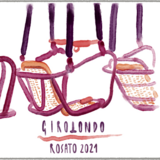Not available


Available bottle sizes:
Other vintages and/or formats available
Tuscany - Italy
Wine
Rosé
Sangiovese
none
none
Not available
Loading...
Opps
Sorry, it looks like some products are not available in selected quantity.
OK

Girotondo Rosato, 2022
Additional information
We currently only deliver within the UK
Buy 6 or more bottles for free delivery!

